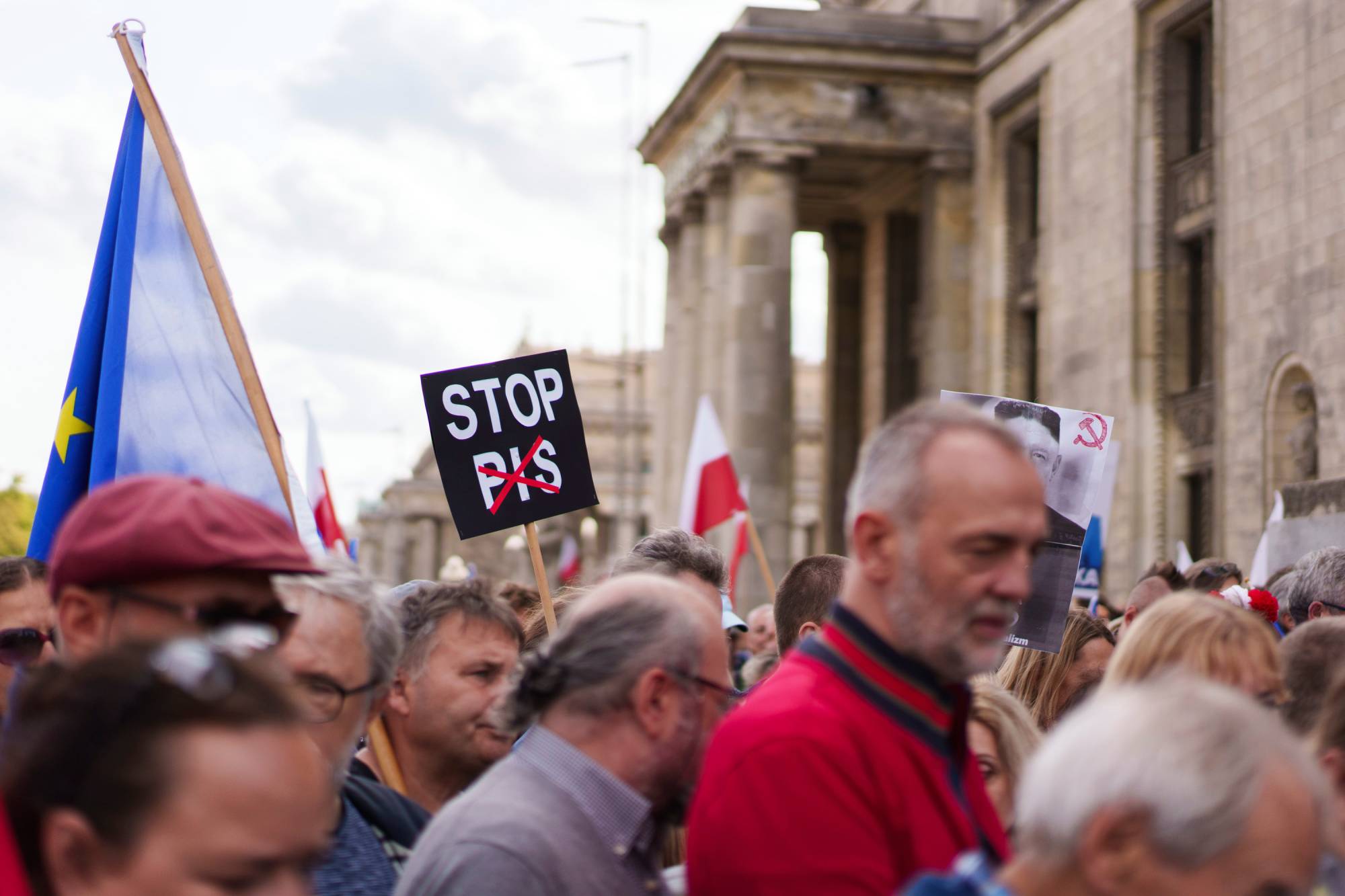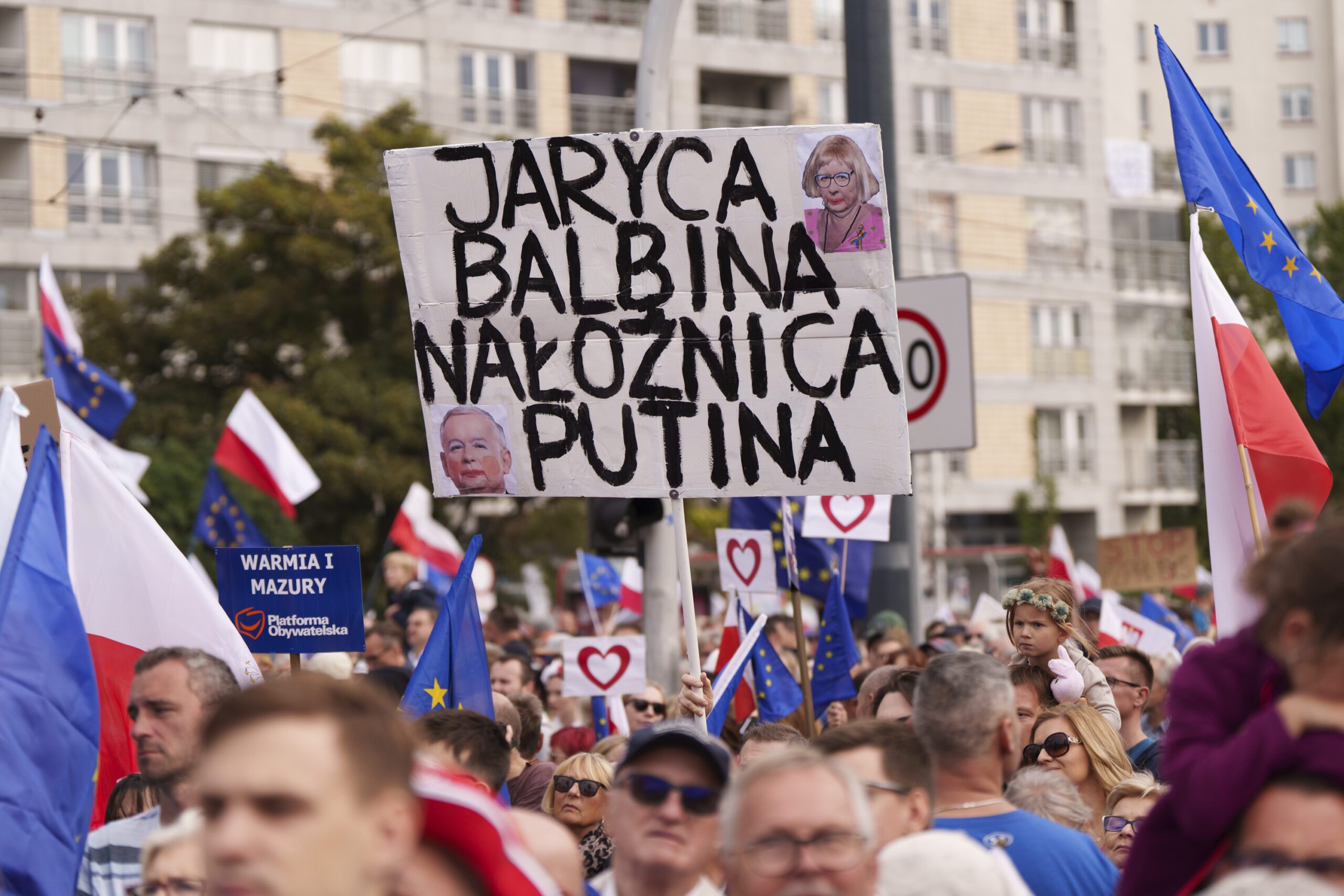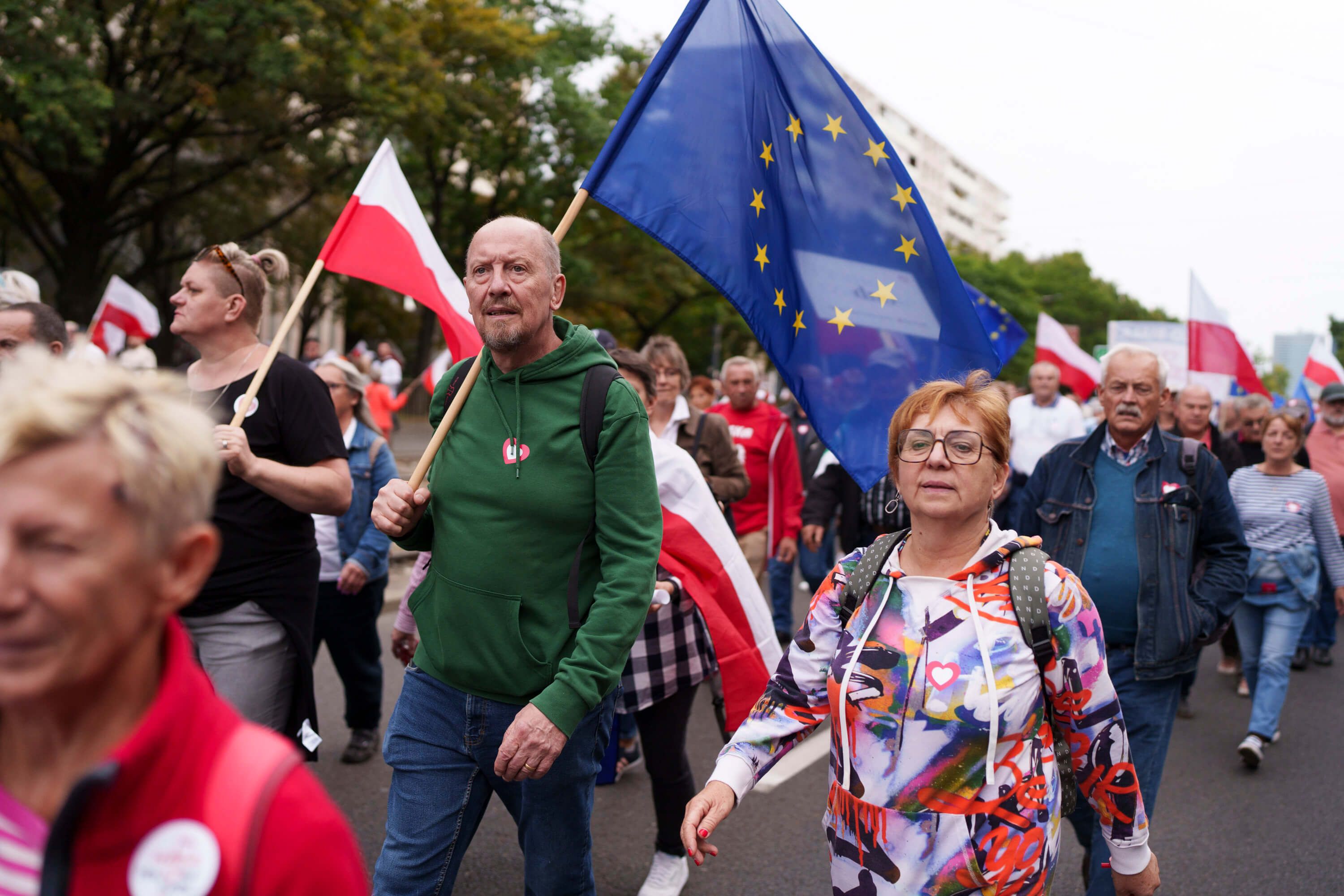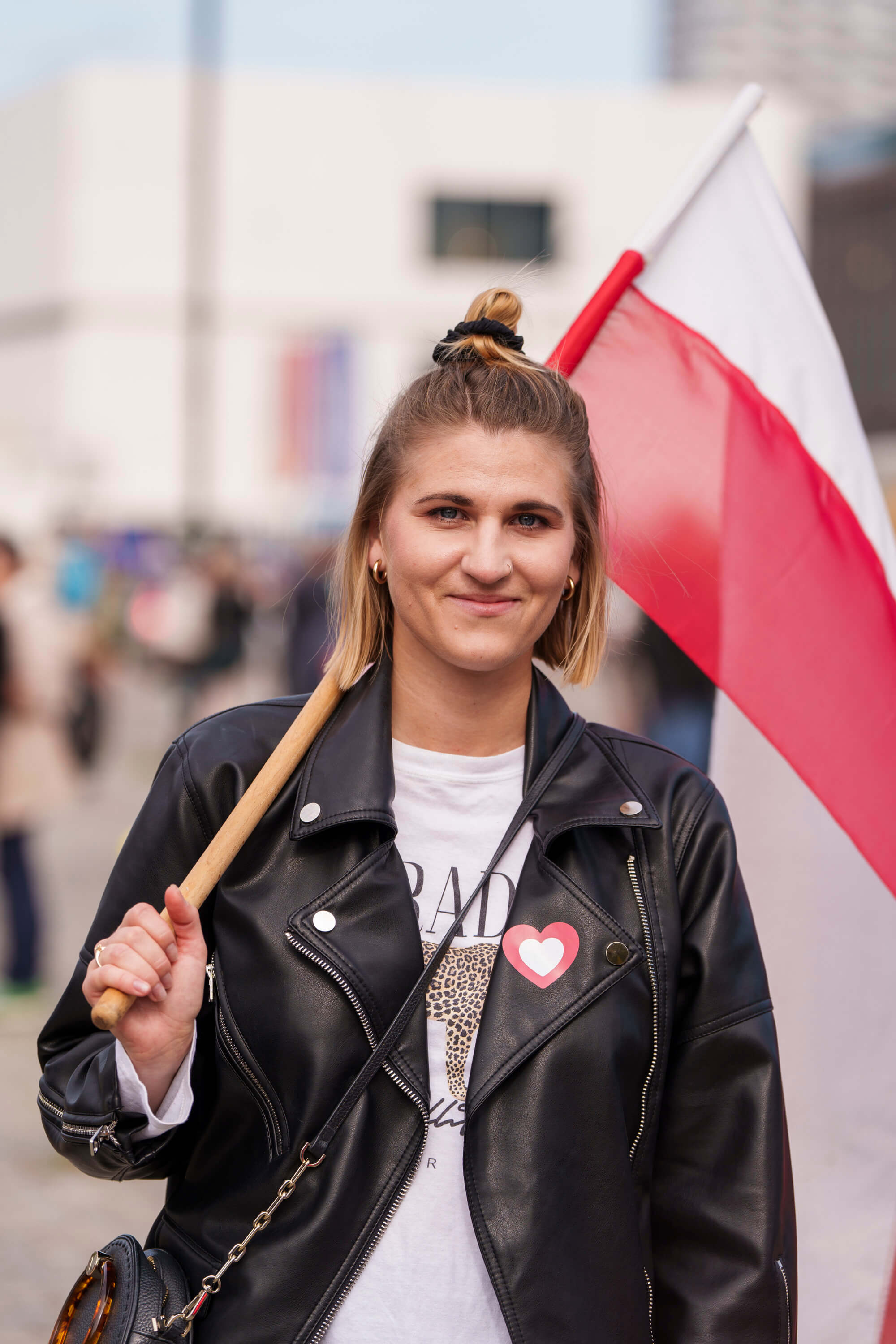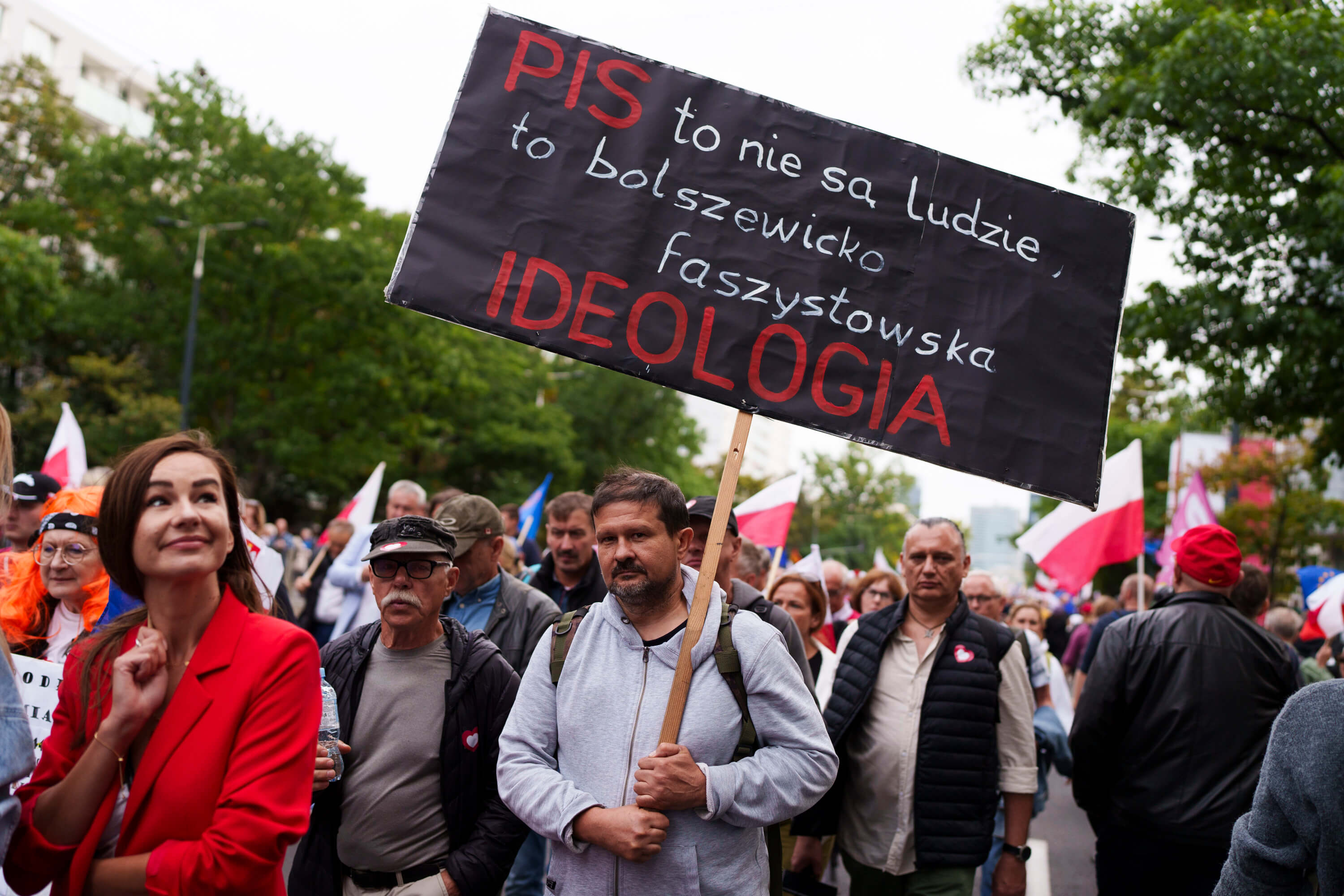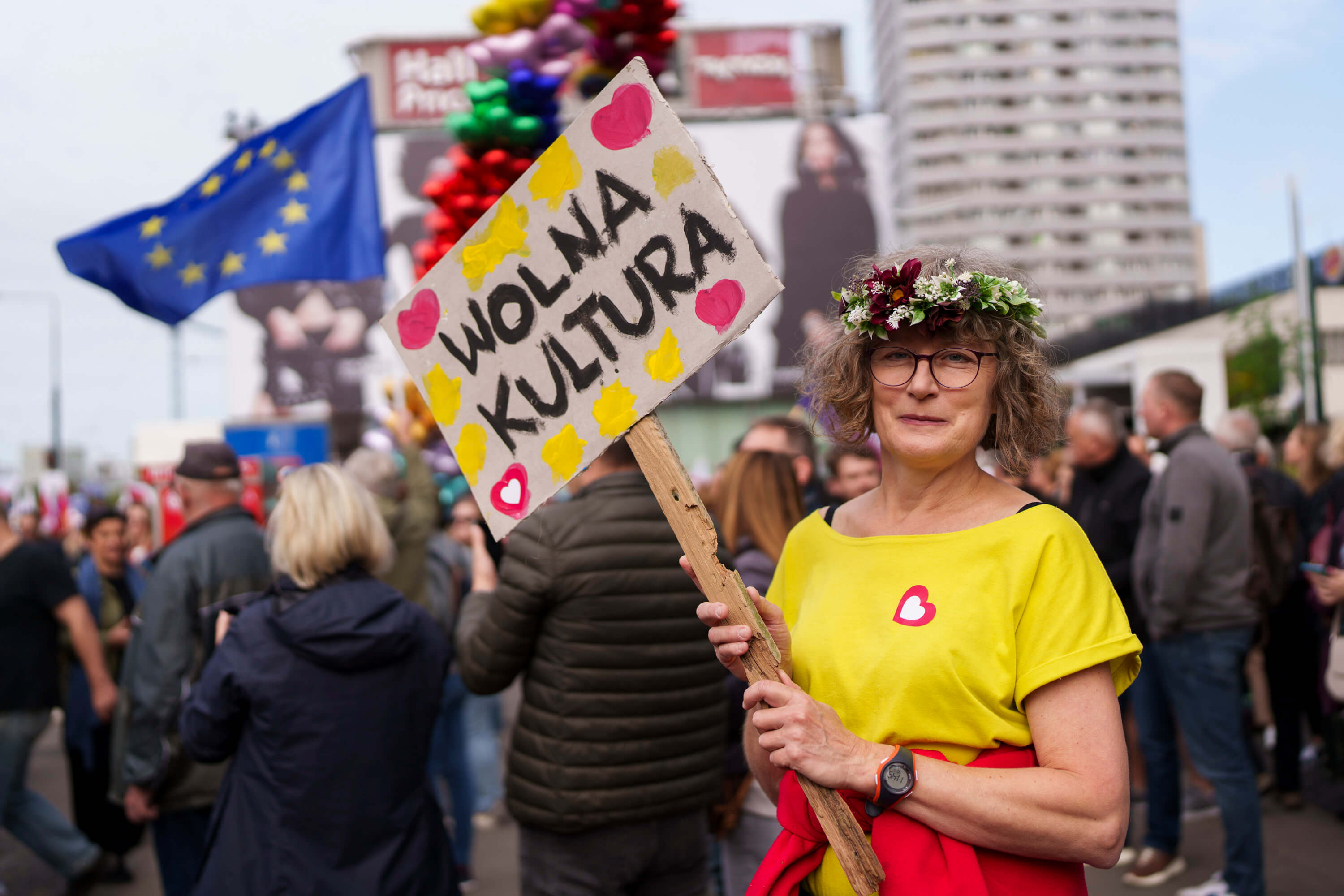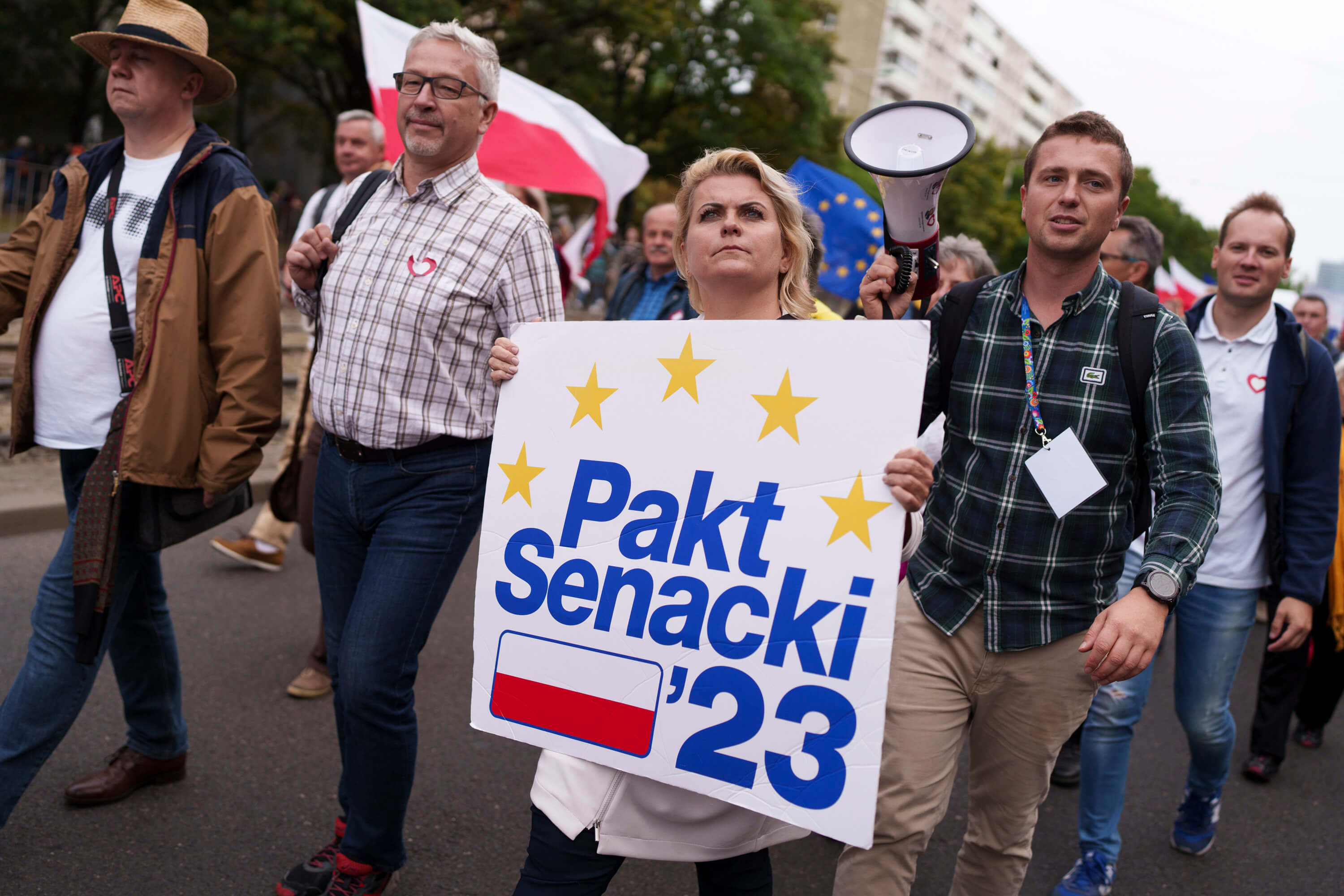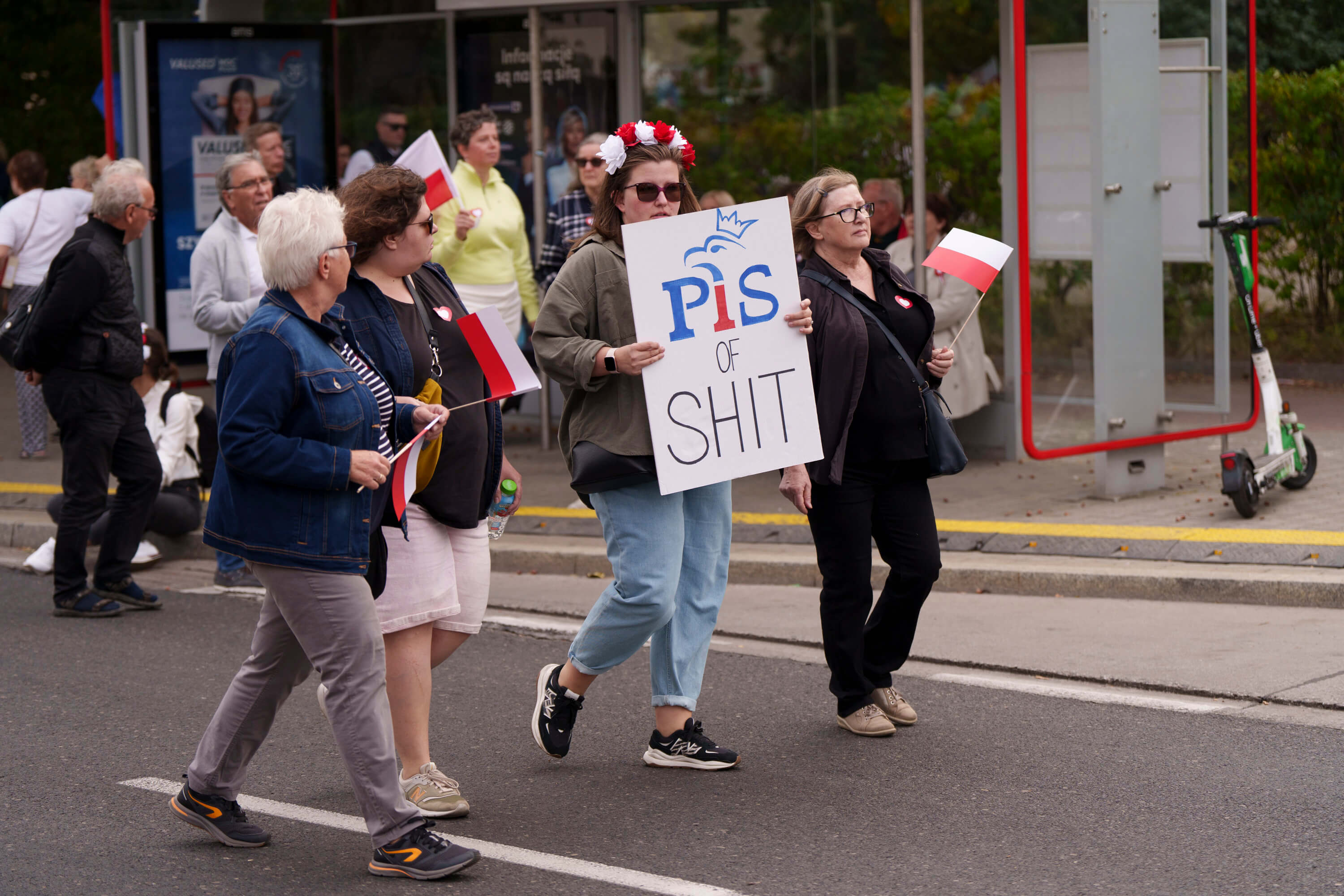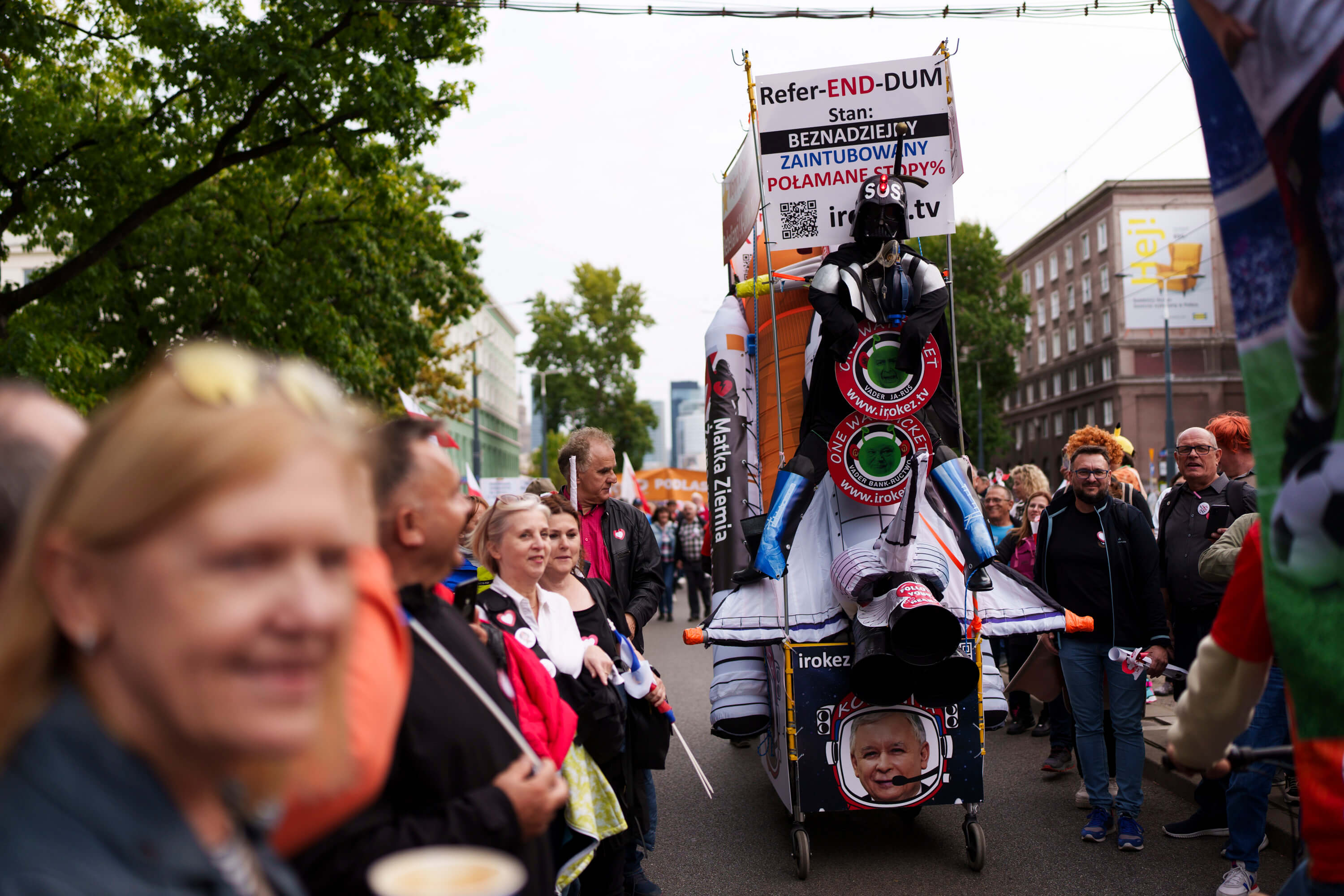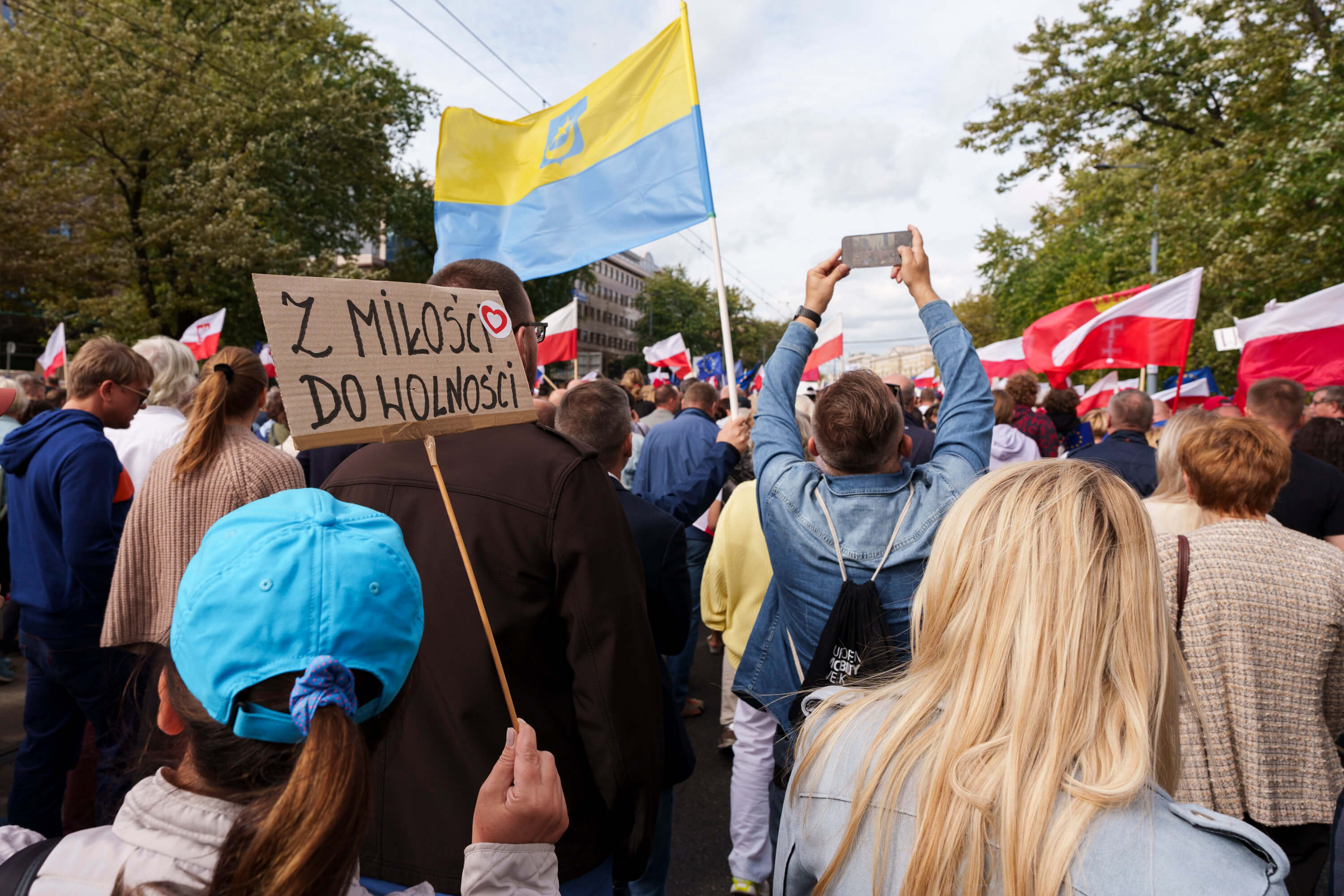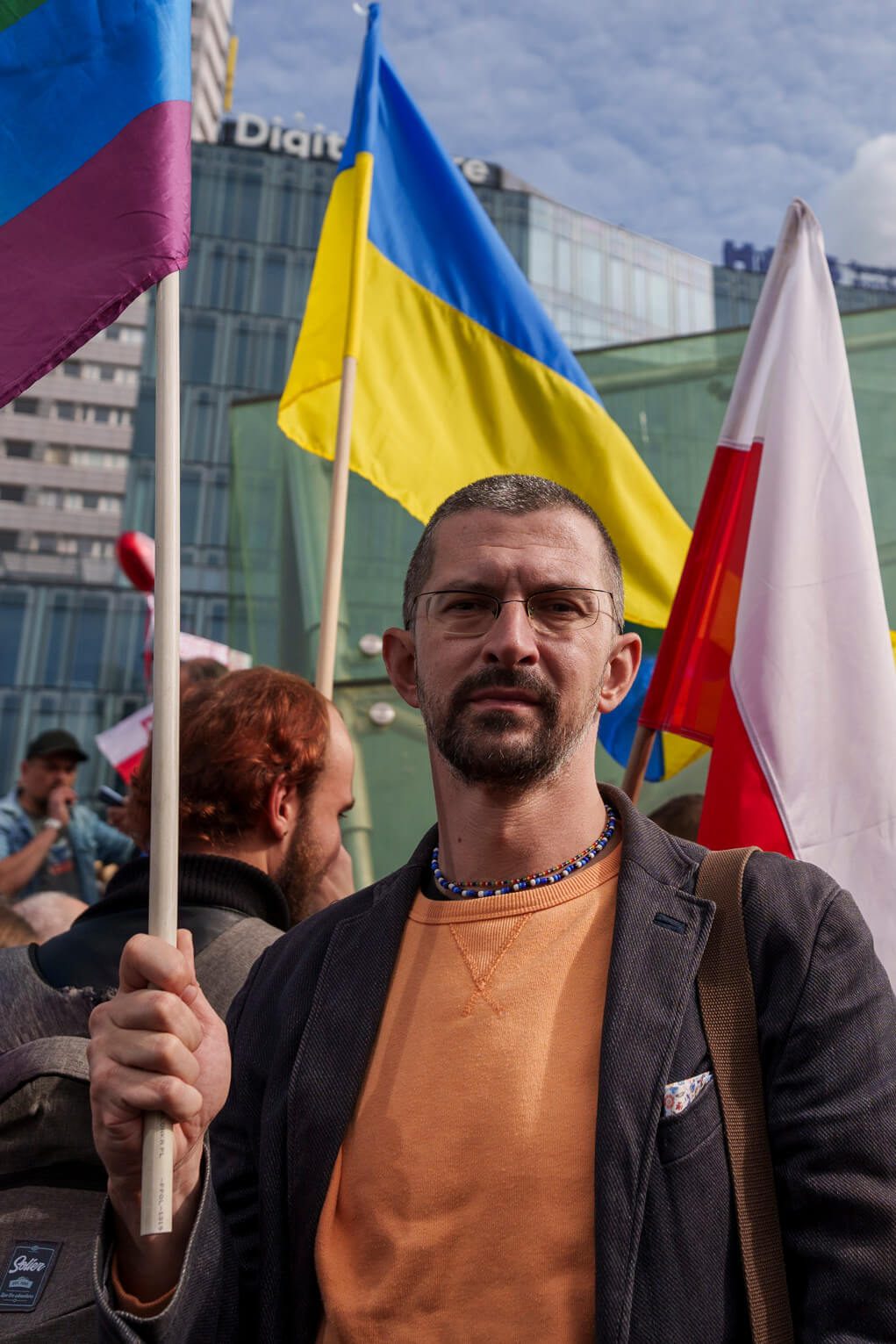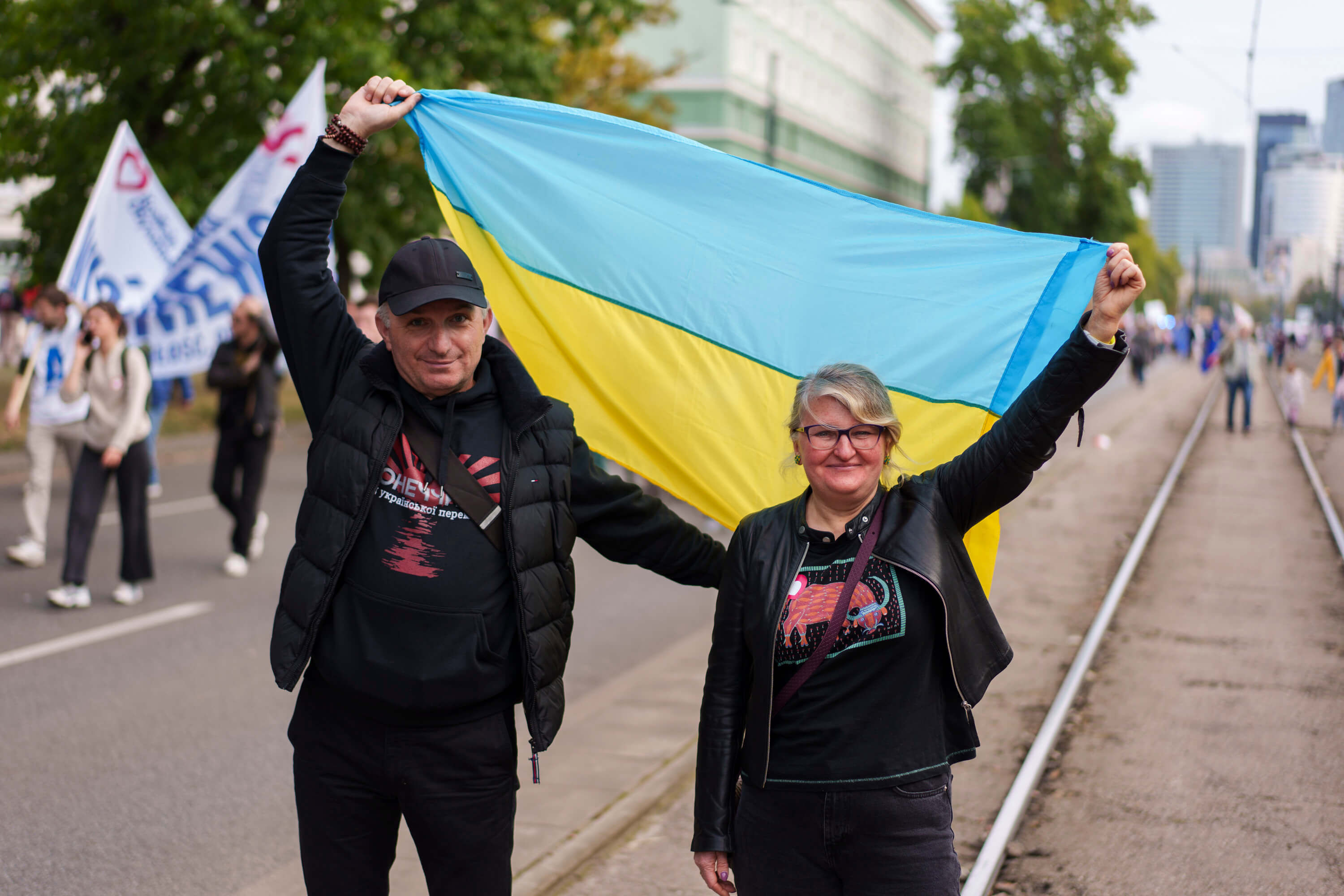On October 1, Warsaw hosted the «March of Million Hearts,» which was attended by over a million people. One of the main issues that prompted the protesters to take to the streets was the ban on termination of pregnancy at their own request. The law was initiated by the ruling party Law and Justice, and the repression has only intensified: the Prosecutor’s Office is now applying tests to determine whether a woman has had a medical abortion, which is likely to criminalize a large number of citizens. Zaborona editor Iryna Oliynyk was at the march. Here is what she saw.
I
Warsaw’s central streets are blocked because of the March of Million Hearts. At around 11:00, people rush to Marszalkowska Street near the Palace of Culture and Science. Large white buses stop near the gathering point — residents of other cities who have come to the capital for one day are getting out of the vehicles to take part in the march.
The participants are holding signs with the words «Stop PiS» and a portrait of the ruling party leader, Jaroslaw Kaczynski. Under his photo is the inscription «Game over». The flags of Poland and the European Union are everywhere, and red and white hearts are visible on the marchers’ clothes, a symbol of a part of society that wants a more liberal course instead of Poland’s eurosceptic and nationalist policies.

Warsaw, October 1, 2023. Photo: Jakub Wosik / Zaborona 
Warsaw, October 1, 2023. Photo: Jakub Wosik / Zaborona

Warsaw, October 1, 2023. Photo: Jakub Wosik / Zaborona
Counting at least an approximate number of protesters is a useless activity; they surround me from all sides, people are tightly pressed together. To see the entire crowd, the photographer and I go up to the observation deck on the 30th floor of the Palace of Culture and Science. From here, the protesters resemble a multicolored avalanche or stream — as I found out later, more than a million people joined the march. We see the huge columns starting to move forward, so we go down and return to the crowd. Law enforcement officers and coordinators are standing around the perimeter, showing people the direction of the march.
Among the crowd, we meet young women, girls, boys and men, the elderly and people with limited mobility. All of them have come together because of the legislative restrictions on citizens and migrants initiated by the ruling Law and Justice party, and in addition, because of the total ban on abortion.

Oleksandra during a demonstration in Warsaw, October 1, 2023. Photo: Jakub Wosik / Zaborona
I approach a girl with blue eyes holding a Polish flag. On her clothes on the left side you can see the symbol of the march, a red and white heart, and a smile shines on her face. “The authorities should respect and understand women’s rights, because we know better what is best for us,” says Zaborona. “Among my friends, every woman believes that abortion laws should not be as strict as they are now.”

Illustration: Maria Petrova / Zaborona
II
In October 2020, the Constitutional Tribunal of Poland amended the Law on Family Planning and Permissibility of Termination of Pregnancy. According to the amendments, abortion is prohibited in Poland, except in two circumstances: the pregnancy poses a threat to the woman’s life or health, or there is a reasonable suspicion that the pregnancy is the result of rape or incest. In both cases, an abortion can only be performed by a doctor up to 12 weeks into the pregnancy.
Poland’s harsh reproductive policies are uncommon and seem quite strange in the middle of Europe; it is so rudimentary and oppressive that Poland has been compared to Gilead, the fictional country in Margaret Atwood’s dystopian novel The Handmaid’s Tale, where religious fundamentalists control women’s bodies, fertility, and reproduction. This parallel is evident and has even become a part of reality: after the law was approved, protesters dressed as red maids held rallies for the decriminalization of abortion in churches in major Polish cities.
At the same time, Poland is the only European country that is regressing in terms of women’s human security and contraceptive access, which dropped to 35.1% in 2020. The year before, in 2019, only a thousand legal abortions were performed in Poland, while about 80–120 thousand women are forced to travel to other EU countries to have the procedure.
This year, in July, an incident occurred that shocked the whole country. Yoanna from Krakow (the woman’s last name is withheld for security reasons) went to the hospital after taking a medical abortion drug without professional assistance. The doctors notified the police, who immediately arrived at the hospital where the patient was staying. Instead of providing medical care to Yoanna, the police interrogated and searched her. The prosecutor’s office, which is leading the case, explains that “the presence of the officers was due to the need to assist the rescue medical team, and they are investigating cases of assistance in abortion and incitement to suicide.”

Warsaw, October 1, 2023. Photo: Jakub Wosik / Zaborona 
Warsaw, October 1, 2023. Photo: Jakub Wosik / Zaborona
Oleksandra tells me that according to Polish law, it is not illegal to take abortion pills in Poland — but only if you can buy the medication legally. The problem is that contraceptives are prescribed exclusively for non-independent use in the presence of medical staff. This significantly increases the chances of unwanted pregnancy — knowing that the medication is only effective for the first 72 hours after insemination, the Polish Sejm is likely to have deliberately made it difficult for women to access contraceptives and doctors, who also do not always have a free window for patients during these critical three days.

Warsaw, October 1, 2023. Photo: Jakub Wosik / Zaborona 
Warsaw, October 1, 2023. Photo: Jakub Wosik / Zaborona

Warsaw, October 1, 2023. Photo: Jakub Wosik / Zaborona
I ask Oleksandra about the loudest cases. She believes that male politicians interfering with a woman’s uterus is not just a repressive reproductive policy, but anti-democracy. For Oleksandra, the ban on abortion is not the only reason she came to the march: the PiS party conducts a eurosceptic policy and has quite tense relations with Brussels and Berlin. The European Commission condemns the Polish authorities for establishing control over the judiciary and for stepping back from democracy. Because of this, the European Court of Justice imposed a daily fine of €1 million for Warsaw’s non-compliance in dissolving the disciplinary chamber of judges. The EU also imposed sanctions and blocked Poland’s ability to receive money from the Reconstruction Fund — another €35 billion. In April 2023, the EU court reduced the daily fine to €500,000. Poland refuses to pay the fine, and the country’s Justice Minister Zbigniew Ziobro called the EU’s demand lawlessness.
“People feel very oppressed by this system run by the PiS party,” says Oleksandra. “The people of Poland don’t want every political party to interfere so much with people’s lives, with how we treat our own bodies.”

Illustration: Maria Petrova / Zaborona
III
The column of marchers continues to move toward the main stage, which is located four kilometers from where the march started. I watch the passersby, those who are in the city center on business. My rough estimate is that six out of ten people are joining the march.

Donald Tusk speaking in Warsaw, October 1, 2023. Photo: Jakub Wosik / Zaborona 
Warsaw, October 1, 2023. Photo: Jakub Wosik / Zaborona

Warsaw, October 1, 2023. Photo: Jakub Wosik / Zaborona
During the march, we notice a man in the crowd holding a Ukrainian flag. This is Andrzej. He came to the march for many reasons, but he is most concerned about the violation of human rights, especially of the LGBT community, as well as the solidarity and support of Ukraine from Poland.
“Conservative parties are needed on the political scene, but first and foremost, they should respect the country’s Constitution, and they don’t,” says Andrzej. “For me, a very important example is the judicial system in Poland. If the courts are dependent on politicians, we cannot have guarantees of justice, and it is no longer a democratic country.”

Andrzej during a rally in Warsaw, October 1, 2023. Photo: Jakub Wosik / Zaborona
Nearby, we meet a Ukrainian woman, Myroslava, who came to the rally with her husband and daughter. The woman is originally from the Lviv region, has been living in Poland for 20 years, and now works for a volunteer organization in Warsaw. The community actively helps Ukrainians with basic needs: food, clothing, housing, retraining, and job search. Myroslava is extremely dissatisfied with the current policy of the Polish authorities, as she has repeatedly encountered violations of human rights, including women’s reproductive rights, in the country.

Myroslava and her husband during a rally in Warsaw, October 1, 2023. Photo: Jakub Wosik / Zaborona
“During these eight years [during the PiS party’s governance], there have been many cases of human rights violations, including many against migrants and refugees. In my opinion, the ban on abortion drives this area underground. There are various non-governmental organizations that help women resolve these issues, and many Polish and Ukrainian women take advantage of this. But, unfortunately, there are cases when women, afraid to go to the hospital, can harm their health and even endanger their lives.”

Illustration: Maria Petrova / Zaborona
IV
The day after the march, I contacted Anastasia Podorozhnya, the founder of Martynka, an organization that helps Ukrainian and Polish women get the necessary abortion drugs. During our conversation, Podorozhna, a red-haired girl with a bob, tells me that 99% of abortions in Poland are performed with the help of pills. It is almost impossible to terminate a pregnancy in a hospital, as doctors have the right to refuse even a raped woman on religious grounds. But that’s not all: like other oppressive policies, the anti-abortion mechanism is evolving. In September, it became known that Polish scientists from Wroclaw had developed a methodology that determines whether a woman has had a medical abortion. The New York Times reports this, referring to the Polish scientific publication Molecules. Thanks to a blood test, the test can track the active substances of the drugs mifepristone and misoprostol in a woman’s body — judging by the fact that prosecutors have already begun using the tests, it can be assumed that a larger segment of women will be criminally liable.

Warsaw, October 1, 2023. Photo: Jakub Wosik / Zaborona
However, Podorozhnya and her organization urge not to be afraid of inspections by the authorities: “When a woman terminates a pregnancy on her own with the help of drugs, and law enforcement agencies conduct such a test and find abortifacient substances, they cannot prosecute her for taking these drugs on her own. This is nothing more than moral pressure, since self-abortion without the help of other people is not considered a crime in Poland.”
The organization emphasizes that if a person orders drugs from abroad on their own, law enforcement agencies cannot bring them to criminal responsibility. Assisted abortion is considered illegal. “Different cases can be classified as abortion assistance,” says Anastasia. “For example, a mother who takes her daughter to another EU country by car for an abortion can face up to three years in prison under the article ‘Assisting with an abortion’. Law enforcement can also detain a partner who gives a woman money to order the pills.”
Podorozhnya believes that despite the total control over reproduction in Poland, the authorities can “tighten the screws” even more. In particular, they may prohibit NGOs and volunteers from providing information on how women can obtain abortion drugs. The abortion pill is a method recommended by the World Health Organization. And drugs such as mifepristone and misoprostol are on the list of key medications that can be taken independently. Medical assistance during pharmaceutical abortion is required in only 2% of cases. According to Martynka, the analysis developed by the University of Wroclaw is only an attempt to control pregnant women and threaten them with criminalization. At the same time, it is impossible to say with certainty that criminalization will not become a reality.

Warsaw, October 1, 2023. Photo: Jakub Wosik / Zaborona


